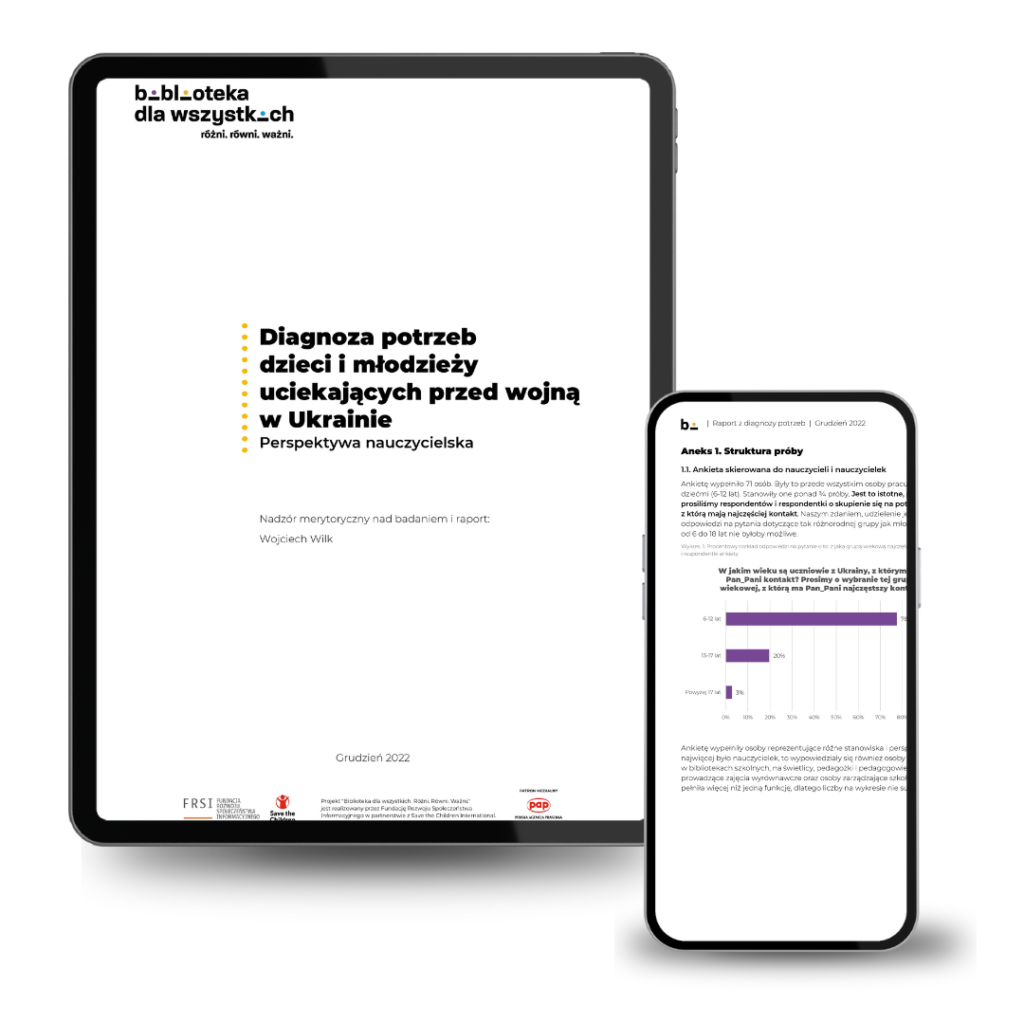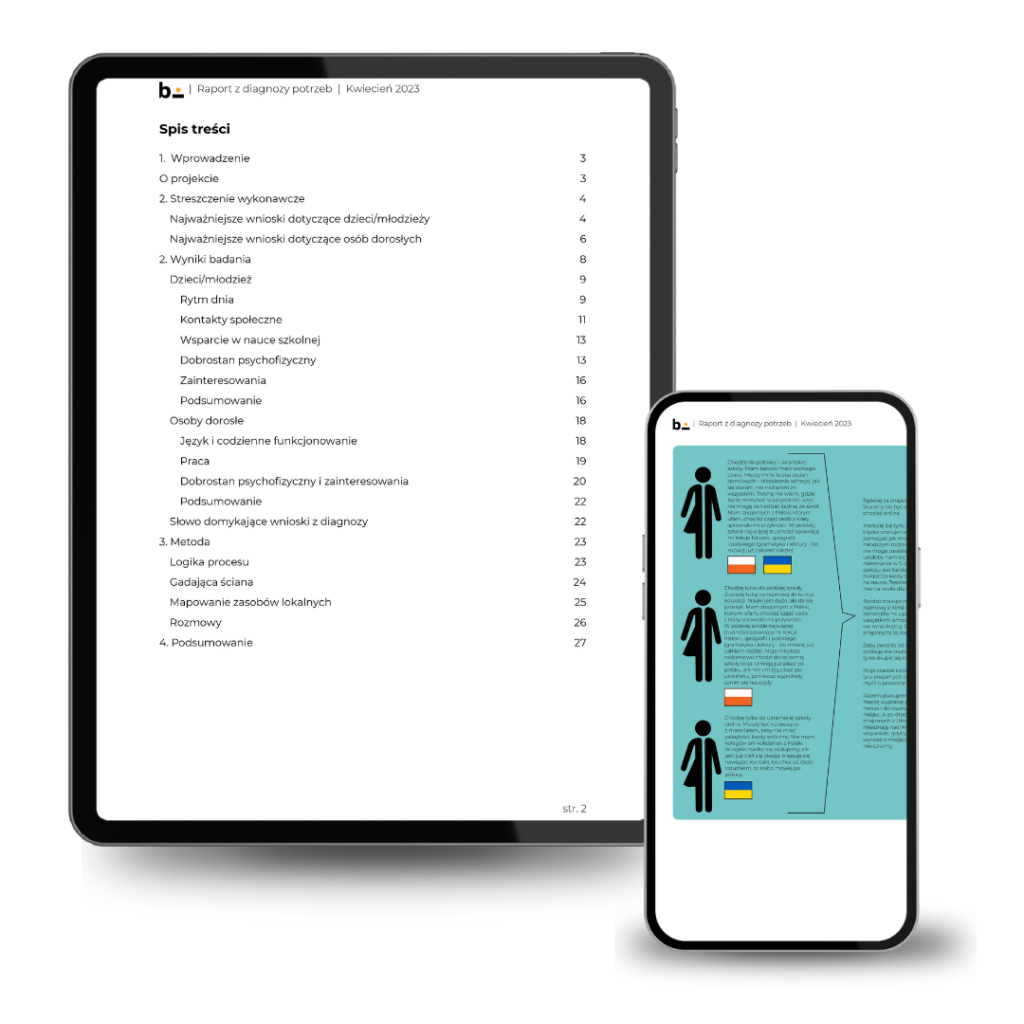Reports
Diagnoza potrzeb dzieci i młodzieży uciekających przed wojną w Ukrainie (część 1)
Przedstawiamy publikację – streszczenie raportu z diagnozy potrzeb dzieci i młodzieży z Ukrainy uczących się w polskich szkołach.
Diagnoza została przeprowadzona w listopadzie 2022 r.
Jej pierwsza część była poświęcona temu, jak dzieci i młodzież z Ukrainy funkcjonują w polskich szkołach. Ankiety zostały skierowane do kadry pedagogicznej w szkołach, a w wywiadach wzięli udział zarówno nauczyciele i nauczycielki, jak i grupa osób prowadzących Cyfrowe Centra Edukacji (CCE) w bibliotekach. Podczas zajęć CCE dzieci/młodzież otrzymują od osoby mówiącej po ukraińsku pomoc w odrabianiu lekcji zadanych w polskiej szkole lub realizacji programu ukraińskich szkół online. Osoby prowadzące zajęcia mają okazję, żeby na co dzień dyskutować z dziećmi o ich wyzwaniach w szkole.

Prezentowana publikacja stanowi streszczenie najważniejszych wniosków z diagnozy. W celu uzyskania szczegółowych informacji prosimy o kontakt z: Moniką Schmeichel-Zarzeczną (monika.schmeichel@frsi.org.pl).
Z publikacji dowiesz się między innymi:
- z jakimi problemami borykają się polskie szkoły, do których chodzą dzieci i młodzież z Ukrainy,
- jakie bariery utrudniają dzieciom i młodzieży z Ukrainy naukę w Polskiej szkole?
- jakie są najpilniejsze potrzeby ukraińskich dzieci i młodzieży, jakich doświadczają trudności?
Diagnoza potrzeb dzieci i młodzieży uciekających przed wojną w Ukrainie. Perspektywa społeczności ukraińskiej w Polsce (część 2)
Przedstawiamy drugą część raportu z badań jakościowych prowadzonych przez Fundację Rozwoju Społeczeństwa Informacyjnego w 2022 i 2023 roku w ramach realizacji projektu „Biblioteka dla wszystkich. Różni. Równi. Ważni”.
Badanie dotyczyło sytuacji dzieci i młodzieży ukraińskiej oraz ich opiekunów w kontekście wyzwań edukacyjnych, społecznych i bytowych związanych z koniecznością emigracji w związku z wojną w Ukrainie.

Badanie pokazało przede wszystkim, jak zróżnicowane są potrzeby dzieci i młodzieży ze względu na wybraną ścieżkę edukacji. Szczególnie wymagająca jest sytuacja dzieci uczących się równolegle w systemie polskim i ukraińskim. Wybór szkoły jest trudny: osoby z Ukrainy mają nadzieję na szybki powrót do ojczyzny, ale jednocześnie pragną stabilności i chcą budować dobre relacje w Polsce, która stała się dla nich drugim domem. Z kolei dzieci uczące się tylko zdalnie w szkole ukraińskiej online często mierzą się z samotnością, wyobcowaniem i wycofują się z relacji rówieśniczych. Wybór wyłącznie polskiej szkoły również nie jest pozbawiony wad. Szczególnie młodsze dzieci tracą kontakt z językiem ukraińskim, nie potrafią pisać i czytać w rodzimym języku.
Raport jest wynikiem badań jakościowych w postaci 80 wywiadów z osobami reprezentującymi urzędy, 93 wywiadów z pracownikami organizacji pozarządowych oraz 142 wywiadów z osobami z Ukrainy. Zastosowano również metodę gromadzenia anonimowych wypowiedzi w postaci tzw. „gadających ścian”(w 43 miejscowościach w Polsce). Jest to w świetle naszej wiedzy największe jak dotąd badanie jakościowe poświęcone omawianej tematyce.
